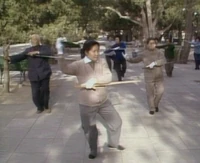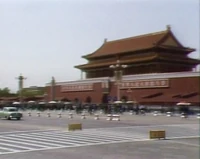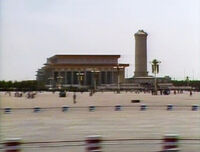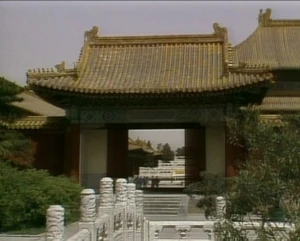
A typical unidentified structure in China
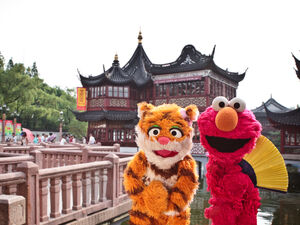
Elmo and Lily on Zhima Jie: Da Niao Kan Shijie.
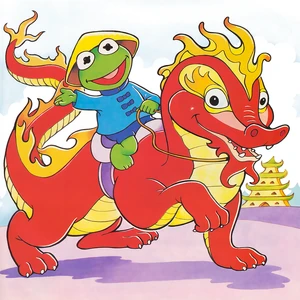
Dragons, a staple of traditional Chinese folklore.
China, currently the People's Republic of China, is a nation state in East Asia, and the most populous country in the world. It has also been a popular location for Sesame Street productions, as well as a leading manufacturer and exporter of plush Muppet merchandise. The following is an attempt to trace the people and places of China as depicted within the realm of Sesame Street productions, including the special Big Bird in China, the Chinese co-productions Zhima Jie (1998-2001) and Zhima Jie: Da Niao Kan Shijie (2010-present), a Global Grover segment devoted to the nation, and other inserts and productions.
History and Folklore[]
An ancient civilization with a culture dating back well over 4,000 years, China played a crucial role in the development of poetry, kites, and tea. As retold in Big Bird in China, the nation's origin in mythological terms involved a battle between the Empress of the Southern Skies and the demon king. The Monkey King is another popular folklore figure, often adapted in animation and puppet shows. Lion Dogs are also prominently featured in local sculpture. Mythology is communicated through the oral tradition and through US co-produced television specials.
People and Culture[]
The people of China are a friendly and polite lot. Xiao Foo is the most prominent of the human residents, while native Muppets include Hu Hu Zhu, Xiao Mei Zi, Ming and Big Bird's identical cousin Da Niao. In China, according to a Washington Post article, "the Muppets adore opera and revere their philosopher ancestors... The local producers toyed with substituting a panda for Big Bird before finally settling on the original (Dia Niao)."[1] Local fauna include ducks, peacocks, and rather aloof water buffalo.
Dance plays an integral role in the daily life of the Chinese people. From the children of North Hsin Hua Street Kindergarten to older adults, the populace participate in an array of ceremonial dances. As television critic Tom Shales remarked, "from the programs produced in China so far... a western viewer could get the impression that folk dancing is the major industry of the country."[2]
Politics[]
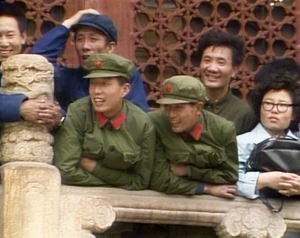
Happy Red Army members, gazing joyously at the Yankee Imperialist bird
China has been a Communist nation since the People's Republic gained government control in 1949, although the government has been reforming the nation's economic system from a Soviet-style centrally planned economy to a more market-oriented economy since 1978. The government imposes tight controls on the media, particularly on TV, to guard against politically or culturally objectionable images. While this can be limiting and place a hamper on creativity, it did not prevent Big Bird in China nor the co-production Zhima Jie, which ran for three seasons."[3]The nation has since shifted to what has been termed "market socialism." This economic and ideological shift is illustrated by the fact that General Electric was the primary sponsor of Zhima Jie.
Foreign Relations[]
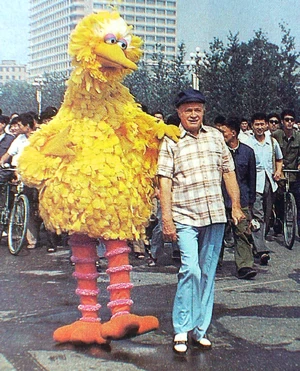
Big Bird has visited China twice, first in the 1979 Bob Hope special The Road to China. That initial encounter was fraught with miscommunications, as Chinese chefs attempted to broil the large bird, and in real life, the local production coordinators initially tried to place Big Bird in a condor nest.[4]
A more elaborate diplomatic mission was documented in Big Bird in China. The cultural mission began with the stated goal of finding the phoenix and, through the meeting of one nation's large bird with another nation's large bird, breaking new ground in Chinese-American relations. The trip involved rather cursory explorations of China's landmarks and cities, and more concentrated cultural exchanges through the friendship with Xiao Foo. Barkley, who accompanied Big Bird as envoy, proved particularly useful in engaging crowds at street markets and providing a foil for the native mythological figures. Organizing the summit meeting was complicated because it could only occur after the American fowl found several locations on a sacred scroll, but contact was finally made. Big Bird's mission was successful, leaving him with a greater understanding of China's mythology, children, and street theater performers.
Geography[]
The geography of China contains a wide variety of landscapes, from grasslands to desert, from mountain ranges to great rivers. The specific mapping of locations within Big Bird's sojourns to China is difficult to ascertain. Beijing was a primary filming location, and such landmarks as the Forbidden City, the ancient palace of the Ming and Quing dynasties, and Mao's Tomb, housing the late PRC Chairman, are only glimpsed in passing. The Great Wall of China ("Great? It's tremendous!") and the Li Jang River are featured somewhat more prominently, playing key roles in the quest to find the items on the scroll.
Transportation[]
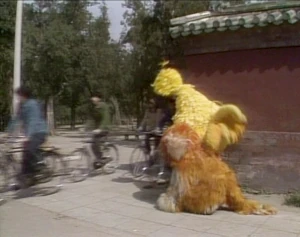
Local populace on bicycles
Within China, which can be reached by a large ship (or a slow boat), transportation options appear limited. Bicycles are popular, and can occasionally create traffic hazards for visiting birds. Walking is commonplace and encouraged, and many small boats go by in the country's waterways. For covering larger distances, motorcycles with sidecars are available for the convenience of tourists and their dogs.
Language and Education[]
The Chinese language encompasses a variety of tongues and dialects, including Mandarin. For Big Bird's purposes, however, translator Xia Foo offered a basic primer: Dà niǎo means "Big Bird," Nǐ hǎo means "hello," and Wǒ ài nǐ means "I love you."
Education is dominated by the basics of print writing. The relationship between the spoken and written Chinese languages is complex. As with other Asian languages but in contrast to the Romantic languages, a single word is encapsulated in one character. The Chinese characters are painted in an ornate, calligraphic manner. Big Bird is able to learn the basics of Chinese writing. The series Sesame English, on the other hand, serves the opposite purpose; Tingo speaks Chinese so as to aid viewers in learning English.
Sources[]
- ↑ Scowen, Peter. "The United Nations of Muppetry." The Toronto Star. November 6, 2005.
- ↑ Shales, Tom. "Envoy with Feathers; NBC's Special for Kids: Big Bird in China." The Washington Post. May 28, 1983.
- ↑ "Sesame Street Goes to China." The Ottawa Citizen. February 16, 1998.
- ↑ Mathews, Jay. "The Orientation of Bob Hope." The Washington Post. June 27, 1979.



